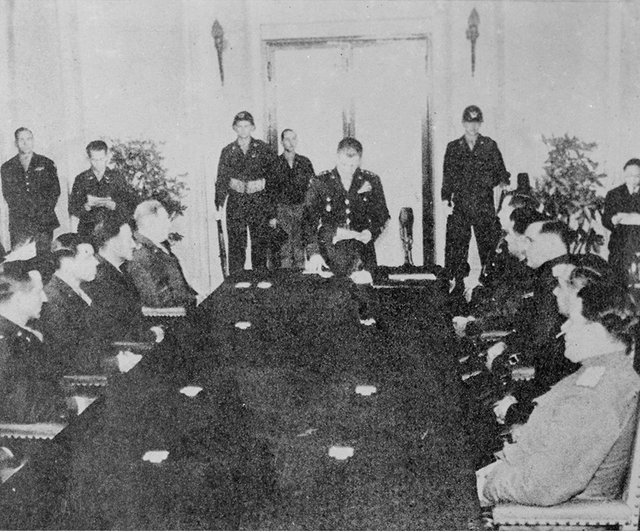(Korean War) The Division of Korea, 1945-1948, Post #23
Prof. Kathryn Weathersby

Given the urgency of the situation in Korea in early 1947, the Special Inter-Departmental Committee worked quickly. The report they submitted in late February concluded that the US position in Korea would soon become untenable if the present policy were continued. However, they did not recommend immediate independence for Korea, since they believed that would lead to even greater economic problems, and eventual Soviet control over the whole peninsula. They considered turning the issue over to the United Nations, as General MacArthur had already recommended. However, this would admit that the US had failed in Korea, which would damage American prestige and violate the Moscow Conference Agreement of December 1945. Since they were unable to find any other solution, the committee recommended that the US appropriate $600 million in economic aid for Korea for the next three years. This would help stabilize southern Korea and send a signal to Moscow that the US was committed to its zone on the peninsula. The committee noted that the only other course was to withdraw American forces, but doing so would seriously damage the US position worldwide.
It is clear from Special Inter-Departmental Committee’s report that American thinking about Korea in early 1947 was shaped by concerns over the escalating contest with the Soviet Union. We therefore must examine this conflict in order to understand the decisions the US made about the division of Korea.
Before 1945, the United States was generally isolationist; protected by vast oceans, it tried to stay out of Europe’s wars. It joined the first world war only in the last months, and entered World War II only after Japan attacked the American naval base in Hawaii. In the wake of World War II, however, this strategy was no longer possible. The formerly great powers of the continent had been severely weakened by the devastating world war. In their place, the two large countries on either edge of Europe – the Soviet Union and the United States – emerged from the war as the only powers with enough military and economic strength to fight a new global war.
The US and USSR had been allies during World War II, but only because they had a common enemy. Soviet ideology had always defined the United States and other capitalist countries as enemies, so Moscow’s alliance with the Western democracies was quickly replaced by hostility once Germany was defeated. In February 1946, six months after the end of the war, Stalin made this new attitude explicit when he declared in a speech broadcast throughout the Soviet Union that the world was now divided into two camps and conflict between them was inevitable. Even though the Soviet people were exhausted from the great war against Germany, Stalin warned that they must prepare for the new war to come.
As American strategists analyzed Moscow’s new posture, they noted that the Soviet Union would be much stronger in the next conflict than it had been before the war with Germany, because it was currently establishing control over the areas it had occupied in the course of the war. The Soviet empire now included not only the northern half of Korea, but also the European states of Estonia, Latvia, Lithuania, Poland, Czechoslovakia, Hungary, Romania, Bulgaria, and the eastern part of Germany. This enormous expansion of Soviet territory and resources meant that a coming conflict would be difficult for the democracies to win. Consequently, American strategic planners regarded any further expansion of the Soviet empire as a threat to the survival of the United States, since this would add even more resources and war-making potential to the Soviet side.
For this reason, Washington was alarmed when the Soviet Union refused to withdraw its armed forces from oil-rich Iran in 1946 and also strengthened the communist party organization in northern Iran. At the same time, Moscow massed military units on its border with Turkey in order to force Istanbul to allow it to station Soviet forces on the Turkish Straits, the narrow passageway between the Black Sea and the Mediterranean Sea. Great Britain had previously been the dominant power in that region, but since it was now so weakened by the war against Germany, both Turkey and Iran turned to the United States for protection against Moscow.
In the next post we will examine how the crises in Iran and Turkey unfolded and how those developments shaped American views of what it should do in Korea.
a truly amazing piece of work,you are incredible my brother,successful always,@wisdomandjustice
Unpaid related discussions
Related discussions
Interesteem(@interesteem) is a service that recommends related discussions using DeepLearning.
Please writing a discussion with #interesteem tag.